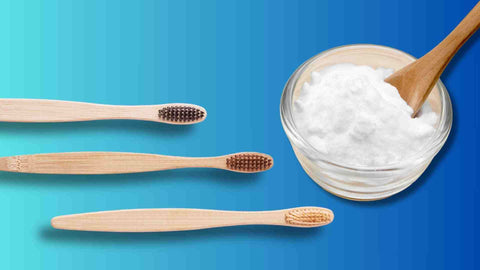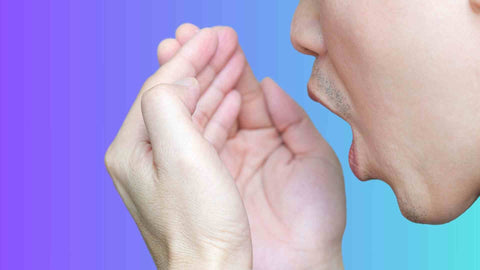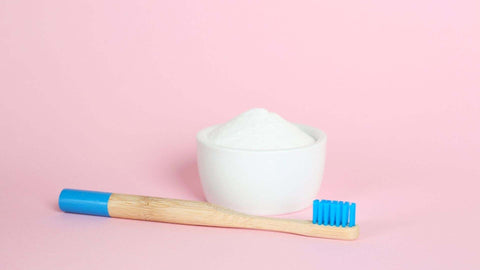Does Baking Soda Whiten Teeth?
Yes, baking soda, also known as sodium bicarbonate, whitens teeth primarily through its mild abrasive properties.
When used as a component of toothpaste or even as a loose powder brushed onto our teeth, baking soda acts a teeth whitener. It gently polishes the surface of our enamel which can remove surface stains caused by coffee, tea, wine, and smoking.
These are generally surface stains that adhere to the outer layer of the tooth enamel and can be scrubbed away without the need for harsh chemicals, such as hydrogen peroxide.
Because baking soda toothpaste is so gentle, it's generally considered safe for everyday use unlike whitening toothpaste which can be bad for your teeth.
Additionally, baking soda makes your mouth less hospitable to plaque-causing bacteria by supporting alkalinity and neutralizing acids. This action prevents future staining and potential tooth decay which can make your teeth appear yellow.
Benefits of Baking Soda for Your Teeth

Baking soda can be great for oral health and teeth whitening, making it a popular and effective ingredient in many teeth whitening products. Let's walk through some of the key benefits together.
Natural Cleaning Agent
One of baking soda's most popular uses is its ability to whiten teeth.
Baking soda's mild abrasive properties make it effective at removing surface stains from teeth, effectively whitening teeth. It can gently polish away stains caused by coffee, tea, wine, and smoking without damaging the tooth enamel.
In some cases however, baking soda is not enough to full remove stains. In these cases, you'll need whitening strips with hydrogen peroxide or a professional whitening treatment from your dentist to solve the issue.
Neutralizes Oral Acidity

Baking soda has a high pH, making it naturally alkaline. This property helps neutralize the acids in the mouth, which are produced by bacteria as they break down food particles.
By reducing acidity, baking soda slightly helps protect enamel from erosion and decay, and can also create an environment less favorable for bacterial growth, potentially reducing the risk of gum disease.
Freshens Breath

The neutralizing effect of baking soda on oral acids also addresses bad breath at its source. Many cases of halitosis (bad breath) are caused by the acidic by-products of oral bacteria. Baking soda freshens breath by creating a less favorable environment for these bacteria to thrive.
Gentle on Sensitive Teeth

For individuals with sensitive teeth, baking soda toothpaste offers a gentle cleaning alternative to harsher abrasives found in some toothpastes. Its effective cleaning action doesn't compromise comfort, making it suitable for daily use by those with tooth sensitivity.
Cost-Effective and Accessible
Baking soda is an affordable and widely available product, making it an accessible option for enhancing oral hygiene. Whether used alone or as part of a homemade toothpaste recipe, it provides a budget-friendly way to support dental health.
Cons of Using Baking Soda as Toothpaste

Now that we understand the pros of using baking soda as toothpaste, let's take a look at the cons.
Remember, you can get around most of these cons by looking for baking soda in remineralizing toothpaste that includes other important ingredients for oral health like nano hydroxyapatite and xylitol.
Lacks Remineralization
One significant drawback of using baking soda products as your primary toothpaste is its lack of nano hydroxyapatite, a critical mineral for dental health. On its own, baking soda cannot remineralize teeth.
The American Dental Association confirms that remineralization is necessary to tackle tooth decay. Unfortunately, anything acidic from lemon juice to wine can induce demineralization which can progress into tooth decay.
Thankfully, we have nano hydroxyapatite which plays a vital role in strengthening tooth enamel and preventing cavities by aiding in the remineralization process of your teeth.
Without nano hydroxyapatite, you miss out on its protective benefits against tooth decay, making it crucial to find alternative sources of remineralization to maintain optimal oral health. Further, studies show nano hydroxyapatite is just as effective as fluoridated toothpaste at remineralization.
Thankfully, our baking soda toothpaste combines nano hydroxyapatite and baking soda for an awesome natural, remineralizing alternative to traditional fluoride toothpaste.
Unpleasant Taste
Perhaps understandably, many people find the taste of a baking soda dentifrice to be quite unpleasant, which can deter its use as a toothpaste alternative.
The salty and somewhat alkaline flavor doesn't provide the fresh, minty sensation that many os us associate with cleanliness and oral hygiene.
This lack of sensory satisfaction can make the brushing experience less enjoyable and may lead to a reluctance to maintain a consistent oral hygiene routine, especially for kids and people with sensitive palettes.
For these reasons, many individuals prefer our baking soda paste (toothpaste tablets) which packs a powerful, natural minty punch.
Messy and Inconvenient
Unfortunately, baking soda makes for a messy and inconvenient alternative compared to traditional toothpaste.
Its powder form lacks the cohesive paste quality that allows for easy application to a toothbrush, and it doesn't give you that satisfying foam during brushing.
This can result in a less satisfying cleaning experience and may discourage regular use, impacting your overall oral hygiene habits.
Limited Antimicrobial Properties
Lastly, baking soda's limited antimicrobial properties mean it does not effectively combat all the bacteria in your mouth responsible for tooth decay and gum disease.
While it can physically clean surfaces, it lacks the specific antibacterial ingredients found in many toothpastes designed to reduce harmful oral bacteria.
Therefore, to ensure comprehensive oral health care, you should supplement your routine with natural toothpaste in addition to brushing your teeth with baking soda.
How to Use Baking Soda as Toothpaste

Using baking soda as toothpaste is a simple method for cleaning your teeth, although it is not as beneficial as using true baking soda toothpaste.
Here's how to do it properly to maximize its benefits while minimizing any potential drawbacks:
-
Prepare Your Baking Soda: Start with a small container of baking soda. Ensure it's fresh and free from any contaminants. You can buy baking soda specifically marketed for oral care or use the same baking soda you have in your kitchen, as long as it's pure sodium bicarbonate.
-
Wet Your Toothbrush: Before applying the baking soda, wet your toothbrush with water. This helps the baking soda stick to the brush and makes the application easier. If you prefer a more traditional toothpaste texture, you can also create a paste by mixing baking soda with a small amount of water in a cup or bowl.
-
Apply Baking Soda: Dip your wet toothbrush into the baking soda, ensuring the bristles are coated lightly. Alternatively, if you've made a paste, use a spoon or your toothbrush to apply the paste to the bristles. A pea-sized amount is sufficient for effective cleaning your mouth thoroughly.
-
Brush Gently: Brush your teeth gently in circular motions, paying close attention to all surfaces of your teeth, including the front, back, and chewing surfaces. Be particularly gentle near the gum line to avoid irritation. The abrasive nature of baking soda requires a softer touch than you might use with regular toothpaste to protect your enamel and gums.
-
Finish by Rinsing: After brushing your teeth for two minutes, make sure to use water to rinse out your mouth and remove all of the baking soda. It's important to ensure no baking soda residue is left, as its alkaline nature can affect the pH balance of your mouth if left for too long.
By following these steps, you can incorporate baking soda into your oral hygiene routine as a natural and effective way to clean your teeth and freshen your breath. That said, don't forget that you'll still need to brush with remineralizing toothpaste and flossing with expandable dental floss daily.
Should I mix baking soda into my toothpaste?

You can mix baking soda into your toothpaste if you like, but this approach is messy, less convenient, and less effective than using a toothpaste that combines baking soda with other important ingredients like nano hydroxyapatite and xylitol.
Nano-hydroxyapatite is renowned for its ability to remineralize tooth enamel, effectively repairing early enamel erosion and reducing sensitivity. It can also whiten teeth, although its mechanism of action is different from baking soda's.
Xylitol, on the other hand, can reduce harmful bacteria in your mouth and promote remineralization. This process prevents tooth decay which can otherwise cause tooth discoloration.
Overall, the most important thing is to choose a toothpaste that combines the natural cleaning power of baking soda with remineralizing ingredients to give you the whitest, healthiest smile.
What if baking soda doesn't get rid of my stains?

If baking soda doesn't get rid of your stains, you can try exploring other whitening options. For example, whitening strips are a popular and convenient at-home treatment option.
These are typically coated with hydrogen peroxide which can break down and remove stains from your enamel. They can be particularly effective for stains that are deeper than surface level, which baking soda may not fully address.
For more stubborn stains or if you're looking for more dramatic whitening results, visiting a dentist for a professional whitening treatment is your best option.
Professional treatments use stronger bleaching agents than those available over the counter, and the process is supervised by dental professionals, ensuring both the efficacy and safety of the treatment.
How fast does baking soda whiten teeth?
Baking soda can whiten teeth relatively quickly, with studies indicating noticeable results after just a few uses.
Research found that a toothpaste containing baking soda was significantly more effective at removing surface stains compared to regular toothpaste, showing visible improvements in whiteness within one to two weeks of consistent use.
For the best results and to ensure the right amount is used, consider using baking soda toothpaste, which provides a balanced formula to protect enamel while effectively whitening teeth.
Frequently Asked Questions
How long does it take to whiten teeth with baking soda?
The duration it takes to whiten teeth with baking soda depends on several factors, including the degree of staining and the frequency of use. Typically, users may start noticing a difference within a few days to a week of regular application. However, to achieve significant whitening results, it may take several weeks of consistent use. It's essential to be patient and not overuse baking soda, as excessive abrasion can damage tooth enamel. Consulting with a dentist for personalized guidance on using baking soda for teeth whitening is advisable.
Is it OK to brush your teeth with baking soda?
It's generally considered safe to use baking soda to brush your teeth once or twice a week as an addition to your regular oral hygiene routine. This frequency can help manage surface stains and maintain whiteness without overexposing your teeth to its abrasive qualities, which could potentially wear down enamel if used too frequently. Always mix it with water to create a paste and use a soft-bristled toothbrush to minimize abrasiveness. Remember, it's important to continue using nano hydroxyapatite toothpaste daily for its cavity-preventing benefits and to consult with a dentist for personalized advice tailored to your dental health needs.
How can I whiten my teeth fast?
To whiten your teeth quickly, consider using over-the-counter whitening products such as whitening toothpaste, strips, or gels. Additionally, professional teeth whitening treatments from a dentist can provide faster and more noticeable results. However, it's important to follow the instructions carefully and not overuse these products, as excessive whitening can lead to tooth sensitivity and other issues. Regular dental hygiene practices like brushing, flossing, and limiting staining foods and beverages can also help maintain a brighter smile.
Can I mix baking soda with toothpaste?
Yes, you can mix baking soda with toothpaste to enhance your tooth-cleaning routine. Adding baking soda to toothpaste can improve its stain-removing power and neutralize acids in the mouth, contributing to a healthier oral environment. When doing this, use only a small amount of baking soda with your regular toothpaste to avoid excessive abrasiveness that could harm tooth enamel. However, it's advisable to consider NOBS Toothpaste Tablets, as they contain baking soda and nano hydroxyapatite, which can support more compact and better remineralization for your dental needs.
Can baking soda whiten teeth in one day?
While baking soda can help remove surface stains on teeth, it typically does not provide dramatic whitening results in just one day. Some people may notice slight improvements after a single use, but significant whitening usually requires consistent application over a period of time. For best results, it's recommended to use baking soda as part of a regular oral care routine.
How long does it take for baking soda to whiten?
Baking soda can start to show noticeable whitening effects within one to two weeks of regular use. Its mild abrasiveness helps remove surface stains, and consistent application can lead to brighter teeth over time. For optimal results, it's best to incorporate baking soda into a comprehensive oral care routine rather than relying on it for instant whitening.






















